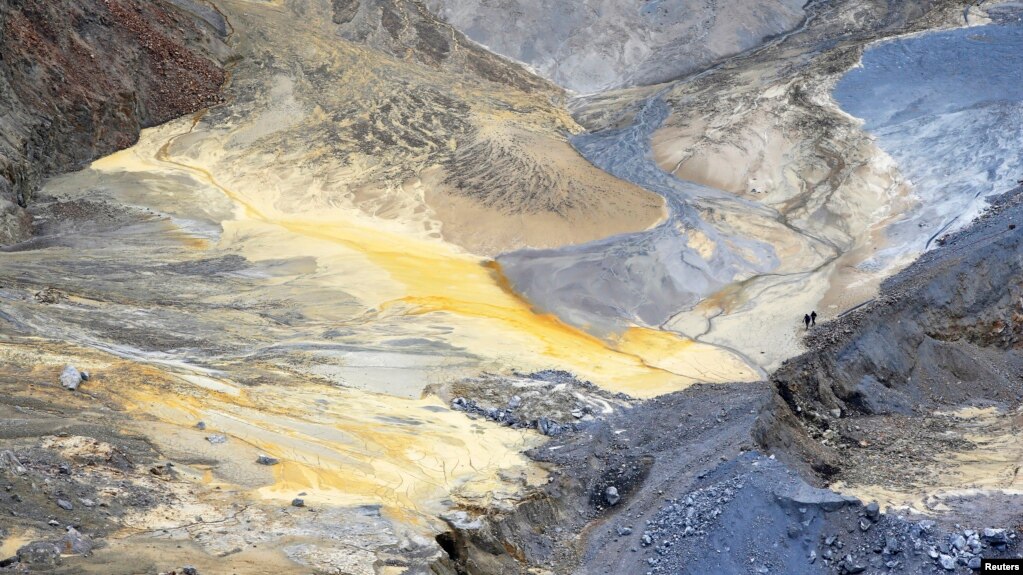For Suzana Jovanovic, a resident living near the edge of an old surface mine, life hasn’t improved since a Chinese company took over the massive copper mining and smelting complex in 2018.
That’s when the state-owned Zijin Mining Group became a key partner in the mining venture on a pledge to invest $1.26 billion and improve environmental measures in return for a 63 percent stake.
The mining operation has grappled with concerns about its environmental impact and the health of nearby residents since it was operated by a state-run enterprise in Yugoslavia, and the promises by Zijin offered hope that things could change.
But Jovanovic says the situation hasn’t improved and Zijin has opened new sites in the area on the back of an additional $3.8 billion investment announced in September 2023.
“There’s so much dust everywhere,” Jovanovic told RFE/RL’s Balkan Service. “We can barely go outside and we can barely open a window.”
Jovanovic says that Sever, the neighborhood in Bor where she’s lived since 1987, is one of the area’s most affected by the mining operation. She says noise can be heard every day from a nearby strip of mines as clouds of dust spread over nearby settlements and pollute the air, something that a growing number of residents say is affecting their health and quality of life.
“I have had three operations so far. I live on medication,” says 86-year-old Roksanda Tasic, Jovanovic’s neighbor who believes that decades of pollution have endangered her health.
The complaints about pollution are the latest episode in the saga around the Bor mining operation since Zijin revived the venture six years ago with its ownership stake.
Since then, Zijin has been repeatedly fined by Serbian officials for pollution violations.
In April 2021, Zijin was ordered to temporarily halt work at the copper mine after it failed to comply with environmental standards and was ordered to build a wastewater treatment plant. The mining giant has also faced protests over its poor environmental record and accusations that it has been involved in untransparent deals to exploit Serbia’s comparatively weaker environmental laws.
Environmental groups have also accused Serbian authorities of turning a blind eye to pollution and health concerns stemming from the copper mine, which is boosting its output and expanding operations rapidly as value for the metal rises amid increased demand for the role it plays in the global energy transition away from fossil fuels.
Hearts, Minds, And Dirty Air
In the face of criticism from residents in Bor and other areas close to the mining complex, Zijin has defended its record.
In response to questions from RFE/RL about pollution concerns, the company said it has steadily reduced any harmful emissions from the mine and taken specific measures to better protect the environment.
A Zijin spokesperson also cited official data from the Serbian government on air quality from six measuring stations based in Bor that compare the concentration of arsenic in the air from 2016 to 2017 and 2023 and 2024.
The reports show that, compared to the measurements from 2016-17 before Zijin took over, the data from 2023-24 shows significant improvement.
“After the smelter was equipped with the latest environmental protection technology and a major cleanup effort was carried out in 2023 and 2024, heavy metals in the air were significantly reduced,” the spokesperson told RFE/RL.
“It’s unfair to expect Zijin copper to solve all the environmental problems that have accumulated over more than a century in just five years,” the spokesperson added, noting that other factors such as “continuous fires at city landfills and exhaust from vehicles” contribute to the polluted air.
Zijin has been active in improving its reputation in Serbian media and within local communities.
In comments to the media, the Serbian government has praised the Chinese company’s role in rejuvenating the country’s mining industry and creating jobs. Zijin has also moved to repair its damaged image with disaffected communities by funding local sporting teams and tournaments.
The company’s PR strategy has also become more assertive and forward-leaning by investing in cultural and educational outreach activities in recent years in the face of attempts by local activists and residents to block access roads to mining sites.
Zijin also says it has invested more than $100 million in upgrading the equipment to improve air pollution caused by excessive sulfur dioxide.
Serbia’s Environmental Protection Agency (SEPA) did not respond to RFE/RL’s questions about air quality in Bor, but the organization said in a June 22 press release that air quality has improved in 2024 compared to last year.
In the same statement, SEPA said the Serbian government has invested more than 500 million euros ($542 million) over the last six years to improve the air quality around the country and announced new plans to launch 40 related projects across Serbia.
Local Pushback And Cancer Fears
Despite the data cited by Zijin and Serbian government agencies, some residents in Bor remain unconvinced.
Toplica Marjanovic, who has been regularly monitoring official data on the level of air pollution in Bor for years through his role in heading the local chapter of the Society of Young Researchers, warns that toxins are still being emitted at the mining operation.
Marjanovic says that — while sulfur-dioxide levels in the air are dropping due to a new smelter plant and a factory that uses sulfuric acid as part of the refining process — this change has resulted in new harmful chemicals being put into the environment.
He adds that there has been a significant increase in the concentration of arsenic and other heavy metals, especially cadmium, in Bor since April 2023 around the time the new factory began operations.
Marjanovic says he bases these claims on official reports on local air-quality monitoring, which are published every month on the city of Bor’s website.
“In 2023, we had two days that exceeded lead concentration at one of the measuring points in the city,” Marjanovic told RFE/RL. “The average annual concentration of cadmium was almost double the permissible values at one measuring point, while arsenic at the same location increased as much as six times.”
Arsenic, cadmium, and other heavy metals are known to cause cancer and pose other serious health risks, according to the World Health Organization.
Marjanovic also claims that Zijin is selectively picking data to provide a better snapshot of the air quality situation than is really the case, noting that the company did not share data from 2018 to 2021 when it was using a reconstructed smelter at the mining complex.
He adds that Zijin also did not mention the concentration of cadmium in its public comments. According to official figures, the concentration of that heavy metal is increasing and has even hit double the acceptable limit at one of the city’s six measuring stations.
“With the increase in the capacity of the smelter and the import of more concentrate, the level of arsenic has been increasing since 2018,” Marjanovic said. “And there is especially a large increase in the concentration of cadmium at all measuring points.”







